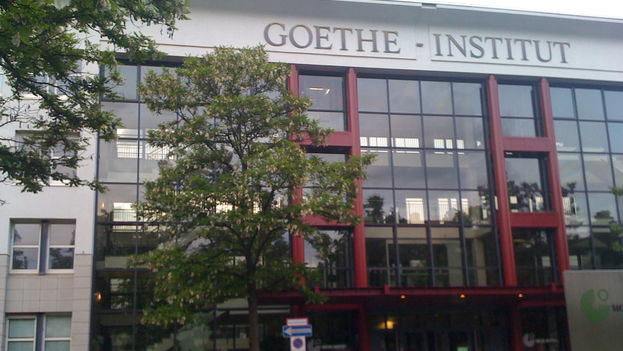
![]() 14ymedio, Yoani Sanchez, Havana, 6 September 2016 – The word made me smile. I read Kaffeeweißer – coffee whitener – on the tiny envelopes near the coffee machine in a Berlin hotel, that promised to “whiten” that dark beverage that was relieving my jetlag. I had forgotten how direct and powerful the German language can be. For years, along with the Cuban Germanophile community, I had awaited the inauguration of the Goethe Institute on the island, but last week a report in Deutsche Welle poured a bucket of cold water on our aspirations.
14ymedio, Yoani Sanchez, Havana, 6 September 2016 – The word made me smile. I read Kaffeeweißer – coffee whitener – on the tiny envelopes near the coffee machine in a Berlin hotel, that promised to “whiten” that dark beverage that was relieving my jetlag. I had forgotten how direct and powerful the German language can be. For years, along with the Cuban Germanophile community, I had awaited the inauguration of the Goethe Institute on the island, but last week a report in Deutsche Welle poured a bucket of cold water on our aspirations.
The longed for opening of the center that would let us observe German culture was only a matter of time. In July of last year, the German Foreign Minister, Frank-Walter Steinmeier, made the first official visit of a German chancellor to our country since the fall of the Berlin Wall. In May of this year it was followed by a visit of Cuba’s Foreign Minister, Bruno Rodriguez Parrilla, to the capital city of bears and sausages.
Like a diplomatic dance, we waiting impatiently for a step here, another there and the prodigal handshakes for the camera. Meanwhile, we counted the days until the country of Georg Wilhelm Friedrich Hegel, Herta Mueller and Gunter Grass would honor Havana with a center of the stature and quality of the Alianza Francesa.
I’ve never found a word that is better at expressing the breakage of something than the German word kaputt. To this, my language of dreams and nostalgia, I owe the force of the verbal sledgehammer that Spanish hides in sinuous constructions and compromises. This crack that means “broken,” and carries with it a sense of frustration, resonated in my mind this Saturday when I read the declarations of the president of the subcommittee on foreign policy for material culture, Bernd Fabius, about the possible causes of the sine die – the indefinite postponement – of the Goethe Institute among us.
“Cuba fears that with the Geothe Institute, which promotes the German language and culture in the world, Germany will encourage the counterrevolution,” said Fabius, noting that the refusal “shows how fragile the systems of such states perceive themselves to be.”
The Cuban government has preferred that the “German dose” come through its own educational institutions and under tight control. In the Faculty of Foreign Languages at the University of Havana there is a lectureship for teaching the German language, but the autonomy of a cultural center – managed directly from Berlin – is not in its plans for now.
A real shame in a country where it is calculated that around 30,000 Cubans studied or worked in the German Democratic Republic while many others have gone in recent years to live in this now united European nation and there is a curiosity mixed with empathy for the Teutonic culture, despite the distance and the marked differences in identity.
Bernd Fabius’s conclusion about the fears of Cuban officialdom are not too far from the real motive for freezing out the Goethe Institute’s project. Every place that is not under the strict rules of ideology, that offers literature not filtered by the island’s publishers, or promotes a view beyond the borders of political blindness and the sea that surrounds us, causes the Plaza of the Revolution to break out in hives.
Most instructive is that the German government has spent years “behaving itself” so that it might make a sign with the name of the author of Faust shine on a Havana street. More than five years of exploratory feelers, plugged ears, caution, and maintaining a great distance from any phenomenon that might upset the olive-green hierarchy. After all this time invested to avoid hurting feelings, the Bundestag has received a loud and clear nein, as can only be heard in the language of Nietzsche.
